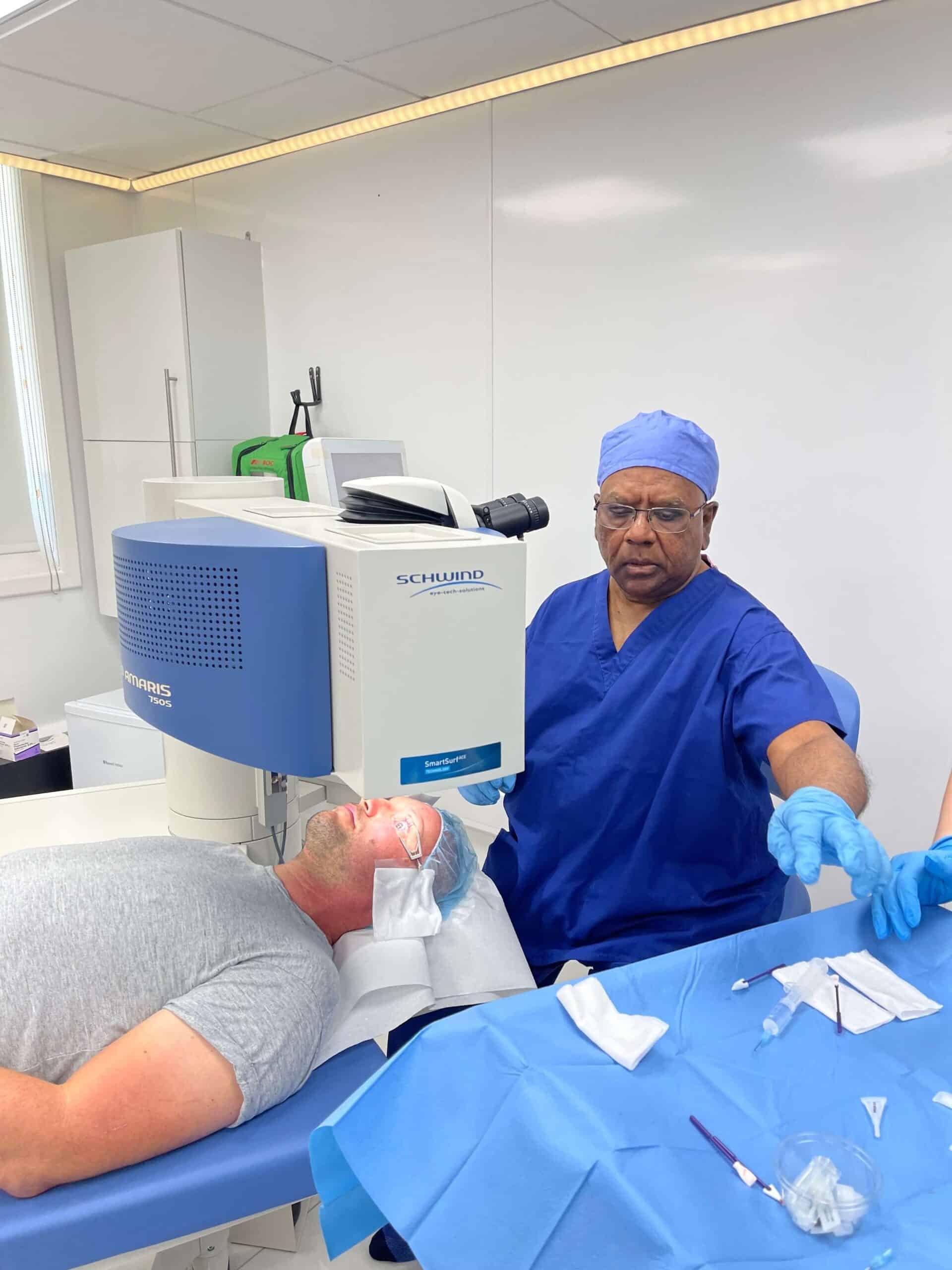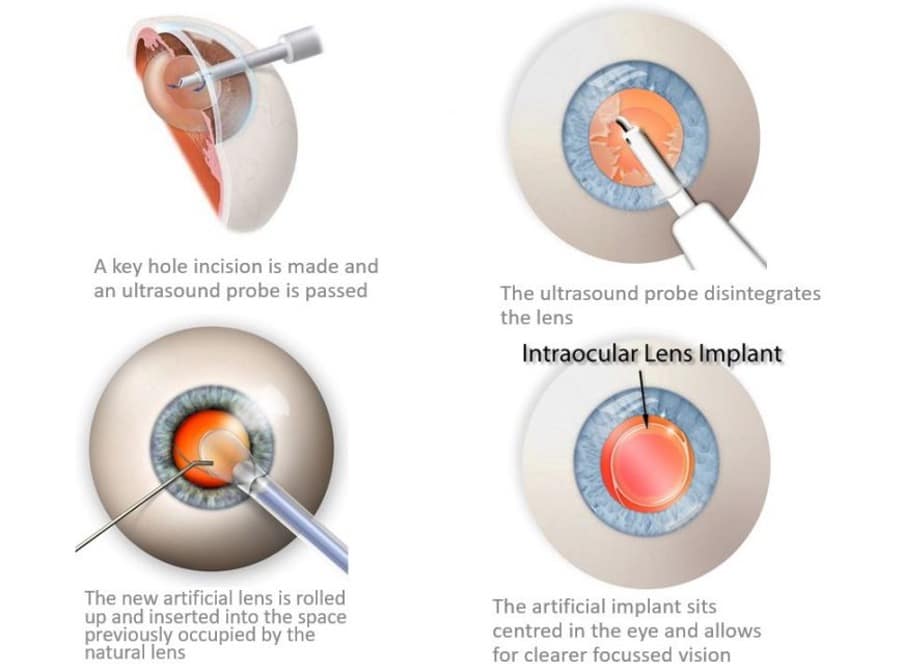The thought of staying awake during lens replacement surgery might make you nervous if you’re thinking about this procedure. But this standard practise makes cataract surgery one of the safest and most common procedures in the UK. Lens replacement surgery boasts an impressive safety record with over 99% of procedures completed without complications.
Many patients feel uneasy about their original concerns of being conscious during lens replacement surgery. The procedure takes just 10-15 minutes per eye. This short timeframe makes staying awake a better choice. Your surgeon can talk to you throughout the procedure and guide your eyes’ position. They can also respond quickly to ensure you get the best possible outcome. These benefits apply whether you need refractive lens exchange or cataract surgery. Learning about what happens during the procedure helps reduce anxiety.
This piece answers your questions about staying awake during lens replacement surgery. Precision Vision London’s specialist eye surgeons gave an explanation of the process. You’ll learn about everything from preparation to recovery and approach your procedure feeling confident.

Understanding the Awake Experience in Refractive Lens Exchange
Patients at Precision Vision London stay awake during their refractive lens exchange procedure. This approach benefits both patients and surgeons in several ways.
Why being awake is standard practise
Local anaesthesia is the preferred choice over general anaesthesia for most lens replacement procedures. You’ll stay awake while your surgeon can talk to you during the whole operation. Knowing how to follow basic instructions like keeping your head still and looking straight ahead helps achieve the best surgical results. On top of that, it removes any risks linked to general anaesthesia, which helps especially when you have other health conditions.
How local anaesthesia works
The team at Precision Vision London starts by numbing your eye’s surface with special drops. You might also get a mild sedative through an injection in your hand to help you relax. You’ll feel comfortable while staying alert throughout the procedure.
Your surgical team uses a spring clip that gently keeps your eyelids open. This lets you blink safely without affecting the surgery area. A protective cover goes over the skin around your eye and keeps your eyelashes away. You’ll rest comfortably under a surgical tent with fresh air flowing underneath. While you’re awake, your vision becomes temporarily blurry—you’ll mostly see light and movement instead of clear images of the surgery. Most patients find this experience surprisingly relaxed.
Safety benefits for older patients
Local anaesthesia gives older patients the most important safety advantages. The biggest benefit comes from avoiding general anaesthesia risks, which can affect older people more. Since older patients might react differently to sedatives, local anaesthesia makes lens exchange surgery easier to handle. Your vital signs get constant monitoring during this brief 15-20 minute procedure. This detailed approach to patient care explains why lens replacement surgery ranks among today’s safest and most effective procedures—especially for older patients.
What to Expect During the Procedure at Precision Vision London
The experience at Precision Vision London starts way before your procedure day. Each step of lens replacement surgery preparation will help build your confidence.

Pre-surgery consultation and planning
Success in lens replacement surgery depends on proper preparation. Your experience starts with a complete consultation lasting approximately 90 minutes. Precision Vision’s specialist team performs detailed eye examinations that include refraction tests, corneal topography, and pupillometry. These measurements give us the data we need to create your personalised surgical plan.
You’ll need to stop wearing contact lenses before your consultation. Soft lens users should remove them 7 days before, while hard lens wearers need 4 weeks. This step lets your corneas return to their natural shape and provides accurate measurements. Precision Vision London creates custom treatment plans that match your visual and lifestyle needs.
What happens in the operating room
The friendly clinical team at Precision Vision London guides you through each step. Your procedure starts with anaesthetic eye drops to numb your eye. You might also receive a mild sedative to help you stay relaxed.
Your surgeon creates a tiny incision (approximately 2.5mm) where your cornea meets the sclera. They perform a capsulotomy to remove a circular part of the lens capsule. Ultrasound technology (phacoemulsification) breaks down your natural lens into tiny pieces. These pieces get removed through suction before your custom intraocular lens (IOL) goes in through the same small incision. This precise technique needs no stitches because the incision seals on its own. You’ll stay comfortable and awake during the procedure.
How long does lens replacement surgery take?
Lens replacement happens quickly, taking less than 20 minutes per eye. Precision Vision London treats both eyes on the same day, unlike other practises that schedule separate appointments for each eye. You’ll rest briefly in the recovery room after your procedure. A specialist nurse checks your progress before you head home. The process from arrival to departure happens smoothly, and you can return home that same day.
Recovery and Aftercare: What Happens After Surgery
The recovery process after refractive lens exchange at Precision Vision London happens quickly for most patients. Your procedure’s success depends on following proper aftercare guidelines.

Refractive lens exchange recovery time
The original healing takes just 2-3 days, and complete visual recovery happens within 4-6 weeks. Patients see much improvement in their vision within days after the procedure. Your eyes will need time to adapt to their new lenses, so some vision fluctuations are normal.
When you can return to normal activities
You can resume most daily activities within 24-48 hours after surgery. Your consultant will let you drive once your vision meets DVLA requirements. You can start light exercise right away, but avoid swimming for about 4 weeks. Getting back to work takes only a few days, based on your job type.
Managing dry eyes and light sensitivity
Surgery can cause temporary discomfort, light sensitivity, and dry eyes. These effects peak during the first week and get better within a month. Your surgeon will give you antibiotic and anti-inflammatory eye drops to help. Quality sunglasses will protect your healing eyes from glare outdoors.
When to update your glasses (if needed)
Your vision needs 6-8 weeks after surgery to stabilise before getting new glasses. This allows your eyes to adjust completely. Your surgeon’s follow-up appointments at Precision Vision London will help determine the best time to update your prescription.
Your Questions Answered by Our Eye Surgeons
Patients often wonder what it’s like to stay awake during lens replacement surgery. Our expert eye surgeons at Precision Vision London have answers to your most common questions.
Can I talk during surgery?
You absolutely can. Our team actually encourages communication during your procedure. Let your surgeon know if you need to cough, sneeze, or feel uncomfortable so they can take a quick break. This kind of open communication helps make your procedure more comfortable.
Will I remember the procedure?
The surgery creates lasting memories for most patients, though they describe it as a comfortable experience. While you’ll stay alert and conscious, you’ll mostly see lights and shapes instead of the detailed surgical work.
What if I feel anxious mid-surgery?
Our surgical team knows exactly how to handle anxiety. The procedure can pause briefly if you feel distressed. Some patients find music soothing during surgery, while others respond well to breathing techniques. Your concerns matter to us – let’s talk about them before your appointment so we can provide the right support.
Do I need someone to accompany me home?
An adult (18+) must accompany you home. Your vision will be temporarily blurred after surgery, so this rule applies whatever transportation you choose.
Is it safe to drive after surgery?
You can usually drive 2-3 days after lens replacement surgery if you can read a number plate from 20 metres away. This aligns with the DVLA’s visual standards requirement.
Conclusion
The idea of staying awake during lens replacement surgery might make you nervous at first. But this approach actually helps make the procedure safer. Each eye only takes 15-20 minutes, and local anaesthesia keeps you comfortable. You can talk to your surgeon during the procedure, which helps them work with more precision.
Your care at Precision Vision London goes far beyond the surgery itself. A detailed pre-surgery consultation will give a treatment plan that fits your visual needs and lifestyle perfectly. Expert surgeons use advanced technology to plan every step of your procedure with great care.
Most patients recover quickly and see better vision within days. You might feel mild discomfort and sensitivity to light for a short time, but these effects usually fade as your eyes heal. Our specialist team stays ready to help if you have any questions.
The safety record of lens replacement surgery speaks for itself – more than 99% of procedures happen without any complications. This impressive track record, plus the way it can reshape your vision completely, is why thousands of UK patients choose this life-changing treatment every year.
If you’re worried about being awake during surgery, our surgical team at Precision Vision London knows exactly how to keep you comfortable. We can play music, guide you through breathing exercises, or just keep talking with you throughout your treatment.
Lens replacement surgery stands as one of modern ophthalmology’s greatest achievements. Quick surgery times, minimal discomfort, and fast recovery make it perfect to treat both cataracts and refractive errors. Your experience toward clearer vision starts with your first consultation at Precision Vision London, where expert care and advanced technology come together.
FAQs
Q1. Is it normal to be awake during lens replacement surgery? Yes, it’s standard practise to be awake during lens replacement surgery. The procedure is typically performed under local anaesthesia, which numbs your eye but keeps you conscious. This approach allows for better communication between you and your surgeon, enhancing safety and precision.
Q2. What will I experience during the surgery if I’m awake? While awake, you’ll mainly see light and shadows rather than detailed surgical steps. You may feel slight pressure, but no pain. The surgical team will communicate with you throughout the procedure, and you can speak up if you feel any discomfort.
Q3. How long does lens replacement surgery take? The procedure is remarkably quick, typically taking only 15-20 minutes per eye. At some clinics, both eyes can be treated on the same day, making the entire process efficient and convenient.
Q4. What’s the recovery time after lens replacement surgery? Initial healing usually takes 2-3 days, with complete visual recovery occurring within 4-6 weeks. Most patients can resume daily activities within 24-48 hours and return to work within a few days, depending on their occupation.
Q5. When can I drive after lens replacement surgery? Driving is typically possible 2-3 days after surgery, provided you can read a number plate from 20 metres away, meeting the DVLA’s visual standards. However, it’s crucial to wait for your surgeon’s confirmation before getting behind the wheel.
Authors & Reviewer
-
 Olivia: Author
Olivia: AuthorHi, I'm Olivia, a passionate writer specialising in eye care, vision health, and the latest advancements in optometry. I strive to craft informative and engaging articles that help readers make informed decisions about their eye health. With a keen eye for detail and a commitment to delivering accurate, research-backed content, I aim to educate and inspire through every piece I write.
-
 Dr. CT Pillai: Reviewer
Dr. CT Pillai: ReviewerDr. CT Pillai is a globally recognised ophthalmologist with over 30 years of experience, specialising in refractive surgery and general ophthalmology. Renowned for performing over 50,000 successful laser procedures.

